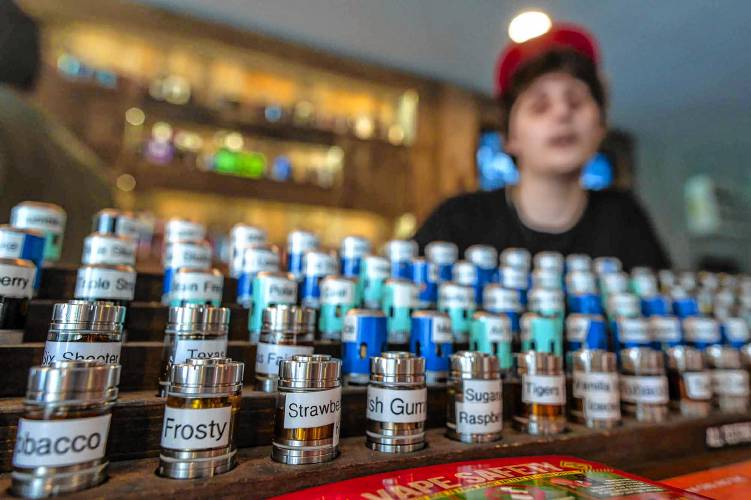Vermont House passes ban on the sale of flavored tobacco products and substitutes

A wide variety of flavors are available for e-cigarette customers at Artisan Vapor in Burlington, Vt., on Friday, July 5, 2019. (VtDigger file - Glenn Russell) VtDigger file — Glenn Russell
| Published: 03-18-2024 5:00 PM |
The Vermont House passed a ban on the sale of flavored nicotine products and tobacco substitutes Friday morning, a key hurdle before the legislation goes to the governor’s desk.
The passage of S.18, after hours of floor discussion Thursday afternoon, was the culmination of years of effort by lawmakers who have sought to protect children from addictive nicotine products with appealing flavors.
“I challenge you to visit any school in your district, and you will either hear from a teacher or a young person about the number of students using e-cigarettes,” said Rep. Jessica Brumsted, D-Shelburne, reporting the bill on the House floor. “Or you might even catch the sweet aroma of someone vaping in a hallway or bathroom. Research has shown that candy-flavored e-cigarettes are definitely hooking youth.”
As passed by the House, S.18 would prohibit Vermont retailers from selling flavored tobacco substitutes, e-liquids and menthol-flavored tobacco products. That would include flavored vape liquids, flavored nicotine pouches like Zyns and menthol cigarettes.
Some non-menthol flavored tobacco products, such as chewing tobacco and cigars, would remain legally available.
Last year, the Vermont Senate passed the ban, although it lost momentum in the House. This session, in the second half of the biennium, House lawmakers made sure to move the bill.
Lawmakers voted on the floor to approve several amendments to the bill, including one that would push back the effective date of the ban from 2025 to 2026 — a decision that was made after “a loss of revenue was considered,” Rep. Carol Ode, D-Burlington, said on the floor.
But several lawmakers still expressed concern about the bill’s financial impact. Last month, the Joint Fiscal Office estimated that the bill could cost the state between $7 million and $14 million in tax revenue annually in the first full years of implementation.
Article continues after...
Yesterday's Most Read Articles
 Herd departs Hartford’s last remaining dairy farm
Herd departs Hartford’s last remaining dairy farm
 At Dartmouth, hundreds protest ongoing war in Gaza and express support for academic freedom
At Dartmouth, hundreds protest ongoing war in Gaza and express support for academic freedom
 Claremont removes former police officer accused of threats from city committees
Claremont removes former police officer accused of threats from city committees
 Over Easy: ‘A breakfast without a newspaper is a horse without a saddle’
Over Easy: ‘A breakfast without a newspaper is a horse without a saddle’
Rep. Jim Harrison, R-Chittenden, said that, given that loss, he could not support the bill.
“That very much concerns me — that we don’t know how much this is going to cost in terms of revenue, and we don’t know how we’re going to replace it,” Harrison said on the floor. “I support reducing tobacco usage of our youth and of adults, but I’m not sure this does it.”
Others raised questions about the fairness of the bill. Banning menthol cigarettes — which are disproportionately consumed by Black and LGBTQ+ people — “feels targeted and harmful,” Rep. Saudia LaMont, D-Morristown, said on the House floor Thursday night.
LaMont said she reluctantly planned to vote yes, even though she saw the bill as hypocritical and condescending.
“It says that Black people and LGBTQ+ people are not intelligent enough to come up with their own decisions and articulate their own vices with autonomy,” she said.
LaMont’s comments touched on a dilemma that lawmakers had grappled with for weeks: Given that menthols were disproportionately used by Black and LGBTQ+ people, should they be left out of a ban? Or would an exemption itself amount to inequitable treatment?
Lawmakers in committee ultimately decided to move ahead with a ban, but assigned the Vermont Health Equity Advisory Commission to study the question. A study is due next January — a year before the ban on the sale of menthol products takes effect.
That will give lawmakers the chance to make changes to the law after receiving the committee’s recommendations, legislators said.
LaMont, however, ultimately ended up voting no Thursday night. On the floor Friday morning, she pointed to the fact that the Health Equity Advisory Commission had been assigned to study the matter — despite the fact that a menthol cigarette ban was already written into the law.
“Equity is not an afterthought,” she said.
The bill passed on third reading Friday morning, after which the Senate could sign off on the House’s changes or the two bodies could convene a conference committee to hash out the differences. Then it would head to the governor’s desk.
In his weekly press conference Wednesday, Gov. Phil Scott expressed concern about the bill’s financial impact and noted that Vermont businesses are allowed to sell flavored alcohol and, now, cannabis products. “So it seems like we’re not being fair about this in some respects,” he said Wednesday. “I’m not sure why menthol, and Zyns and so forth, is getting all the attention.”
Jason Maulucci, a spokesperson for the governor, said in a text message Friday morning that the governor was still undecided about whether he would sign the bill.
Scott is “concerned by the inconsistency of the policy, the expansion to other products beyond menthol, and the revenue implications, which have not been contemplated,” Maulucci said.


